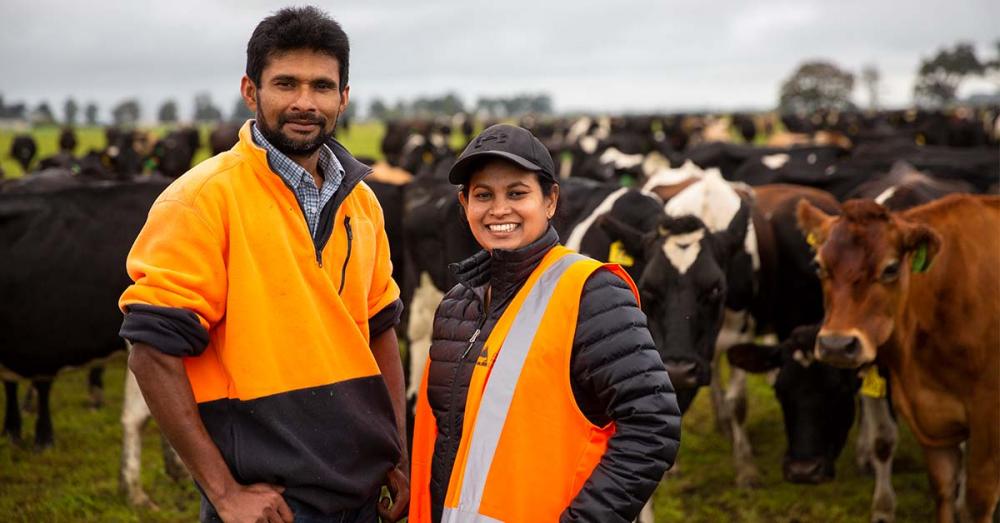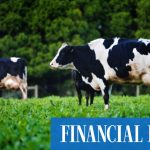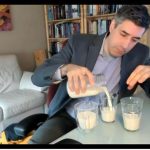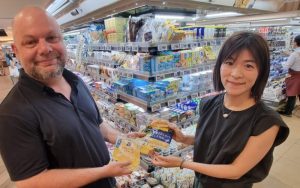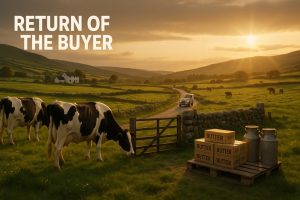
Dreams of a better future are coming true for Sri Lankan immigrants Dinuka and Nadeeka Gamage, as they climb the dairy career ladder and become part of the Canterbury farming community, and were recently named Regional Share Farmers of the Year.
Dinuka came to NZ 13 years ago, a couple of years ahead of Nadeeka and their two sons, believing there were far more opportunities here than they could expect at home.
“I wanted to get into the agricultural industry and I’d read about New Zealand, so for a couple of years I was thinking that was the best place to go for a better future for me and my family,” Dinuka says.
In 2008 he applied online through a recruitment agency and was offered a job as assistant herd manager on a farm near Kaikoura, a world away from his family and the life he knew.
“It was a bit tough in the beginning,” he says, especially as it was before smartphones made keeping in touch with loved ones back home easy.
The property he was working on was on the Inland Road that connects Kaikoura with the South Island interior, the last dairy farm before the steeper hill country, about 20 minutes out of town.
“There was no proper reception for cellphones, it’s really rural that Inland Road, a lost world in there,” he says.
On his days off he’d go to an internet cafe in Kaikoura so he could use Skype to call home.
“I could show the internet cafe to Nadeeka but that’s full of people and I couldn’t go outside with my phone. So I would sometimes print photos at The Warehouse and send a parcel,” he recalls.
On-farm, Dinuka was on a steep learning curve.
“I think compared with around the world, not just Sri Lanka, New Zealand farming is more developed, there’s a different system here. There are different words used in farming that you won’t find in any dictionary. I’ve learnt from zero,” he says.

Dinuka came to New Zealand two years before his wife Nadeeka and their two sons joined him. They are well settled with the boys attending local schools. Thejan, 10, Nadeeka, Dinuka and Anu, 14.
Realising how much he had to learn, he started a milk quality course with Primary ITO on his second day in the job and he’s done just about every available course since then too. He has since completed a NZ agribusiness management diploma.
“I started learning something every day and every year I did a course to get the knowledge I needed of New Zealand farming,” he says.
“I learnt from colleagues and managers, my bosses, looking at what they were doing and I always looked at how they were progressing in the industry.”
From the beginning, Dinuka wanted to progress too and to help fund that he saved hard.
“I never sent any money to Sri Lanka, I saved money here,” he says.
“Most of the time migrant workers are sending money home but I wanted to stay here so I saved and that’s why I’m here today in the dairy industry.”
Meanwhile, Nadeeka and their sons stayed with her parents in Sri Lanka. Looking at her husband’s photos she thought NZ looked like heaven, but it would be two years before she came here and in that time she only saw Dinuka once, when he came home for a holiday after a year in NZ.
The couple were teenage sweethearts and met in high school. Nadeeka grew up in Kandy, in central Sri Lanka and Dinuka in Ampara in the east. They married in 2005.
After graduating with a National Diploma in Technology Agriculture Engineering, Dinuka, whose parents are cropping farmers, worked for Pfizer Pharmaceuticals Sri Lanka selling veterinary products all over the country. Among his clients were dairy farmers and Dinuka was attracted to the industry, albeit not at home but in NZ where he could see more scope to get ahead.
He stayed in Kaikoura for one year and then moved to a farm in Culverden where he started as assistant herd manager, then moved up to herd manager/2IC and finally to farm manager.
After two years in NZ he returned to Sri Lanka to bring Nadeeka and sons Anu and Thejan to Culverden in North Canterbury.

The farm the Gamages contract milk on is owned by dairy Holdings Ltd.
“In the pictures it’s like heaven but when we arrived, we were alone. There was nobody here, it was isolated, we couldn’t talk, and we had no connection to back home. The first year was very hard for us,” Nadeeka says.
As the only Sri Lankans in the district, Nadeeka found life in NZ very lonely at first but gradually built a network.
“I started going out to Playcentre and Plunket and met people there, and when my sons started school I made a lot of friends there,” she says.
Nadeeka studied childhood education via Open Polytechnic and then worked at a pre-school in Hanmer Springs, about half an hour from Culverden. On the farm, Dinuka kept learning and rising up the hierarchy, all the time thinking about the next step up the ladder.
“I was busy, busy. When I’m milking, putting the cups on, I’m thinking. It’s a good place for thinking about what to do next,” he says.
In 2016 he entered the dairy industry awards and was placed third in the regional dairy manager section. That proved a pivotal moment.
“I’m here today because of the dairy awards,” he says.
“They’re a good opportunity to go through progression in the industry because you can find and meet the people and establish a good reputation.”
One of the people he met was judge Mick O’Connor, a farm supervisor at Dairy Holdings Ltd (DHL), a large-scale South Island corporation that owns 60 farms. The following season the Gamage family moved to a DHL farm at Ealing, just north of Rangitata River in Mid Canterbury, where Dinuka took on a contract milking job.
DHL has a hybrid system, something of a cross between contract milking and lower order sharemilking. The Gamages employ their own staff, have their own farm machinery and pay 20% of costs, including winter grazing, power and irrigation, and are paid at a higher rate than standard contract milking jobs.
They also have the opportunity to rear and own excess calves for a charge of $100 each, basically the cost of milk to get them to 100kg. When the calves leave the dairy farm for a grazing block they take ownership of their share and pay the cost of grazing them on Dairy Holdings pasture.
Dinuka and Nadeeka now own 250 cows, comprising 14 they brought from Culverden and the rest acquired from DHL, which are leased into the 980-strong herd on the 246ha effective farm.

Dinuka in the shed takes a note of cull cows and checks out the farm map to select which paddocks to feed next.
Supervisor Mick, who oversees 13 farms including South Ealing Dairy where the Gamages live and work, says giving staff the opportunity to own their own cows is good both for them and for DHL. As well as his supervisor role, Mick 50:50 sharemilks on a DHL farm and grew his herd the same way as the Gamages are doing.
“I still remember when I had my first 15 cows and I would go out and find one in the herd of 1100. It’s a pretty special feeling putting your own tag into that cow, and that 15 for me has now grown into 2000,” Mick says.
“It starts small and then it gains momentum so we are prepared to give something away but there’s also some opportunities. We get some really good people so there’re wins on both sides.
“They’re building their equity through livestock and we can’t run 60 dairy units without really good people — they’re the key to what we do.”
Since he arrived in NZ, Dinuka has seized every opportunity he’s been given.
“Dairy Holdings is a good corporate company with support from farm owners and management. There are good options inside Dairy Holdings, including sharemilking opportunities, so I’m quite keen to stay here,” Dinuka says.
“Our main target now is rearing stock and to keep increasing our cow numbers with the ultimate goal of 50:50 sharemilking in 2023.”
As well as heifers, the Gamages rear bull calves, which they sell to supplement their income.
Since moving to Ealing, Nadeeka hasn’t gone back to working with preschoolers but is fully involved in the farm business, looking after administration, staff, relief milking and calf rearing.
In addition to Dinuka and Nadeeka, there are three permanent staff, all Sri Lankan, with an extra worker taken on for calving. The Gamages know how hard it can be arriving in a new country so they do their best to make it easier for new arrivals.
“When a new overseas person starts a job we offer food for two weeks until they get their first payment, we offer them a cosy warm house and other basic needs, basically everything,” Nadeeka says.
But more than that, they encourage new arrivals to look beyond milking cows and collecting wages to the opportunities that exist for progression.

The Gamages know how hard it can be to arrive in a new country so they do their best to make it easier for new arrivals and look after them until they are settled. Dinuka and assistant herd manager Chandana Hettiarachchige in the shed.
“A lot of dairy staff just come to New Zealand for the milking, they don’t want career progression, they’re stuck in a dairy shed milking and thinking that’s why we came to New Zealand,” laments Dinuka.
“But I always tell them ‘look at us, this is a good country and there are good opportunities, so think about it and start learning’. I always encourage my staff because all of them are immigrants.”
When new people start, their skills are assessed and then the Gamages suggest goals and give them a training plan with Primary ITO.
“I’m mentoring them and showing them the path. This is not only milking, you can own the cows one day, you can own the herd, there’s a pathway for us and I show them,” he says.
Mick visits the Gamages fortnightly.
“Whenever we have a catch-up you definitely get the benefits when you have both of them in the room, they’re a good strong team,” Mick says.
“Nadeeka has a really good thought process around what could work and Dinuka has a lot of good ideas. They’re very smart people, very well educated and they see the opportunities.”
DHL uses System 3 on its farms, fully grass-based with minimal supplements. If supplements are needed during the season, they’ll be bought in.
“We don’t buy supplements to extend lactation. We try to harvest all the pasture and produce milk. We make our own silage when we have a grass surplus and feed that back to the herd if we need to,” Dinuka says.
The farm is irrigated by three centre pivots and a lateral irrigator that covers 224ha, with two rotorainers and K-line watering the remaining 21ha.
Dinuka does a weekly farm walk to measure pasture and uses DairyNZ’s spring rotation planner as well as their autumn feed planner to help manage the grass. Empty cows are culled early, with all gone by the end of March to reduce feed demand.
The cows are independently condition-scored four times a year, pre-calving, pre-mating, early autumn and late autumn, and lighter cows are dried off early.
Mixed-age cows are wintered off-farm on a DHL grazing block for 60 days where they’re fed fodder beet managed by Dinuka and his staff. They winter 230 heifers on the dairy platform feeding grass and straw.
Since the outbreak of Mycoplasma bovis, DHL has operated a closed herd and breeds its own crossbred bulls. Mating runs for 10 weeks, six weeks AI with LIC Premier Sires Daughter Proven crossbred and Jersey bulls, and four weeks with DHL-bred bulls.
Heifers are mated one week before the main herd. Heifer calving is due to start on July 25 and the main herd on August 1.
Total production on the South Ealing farm was 330,000kg MS in 2019-20, up 6000kg MS on the previous year.
Dinuka and Nadeeka reckon every step they’ve taken since coming to NZ has been a forward one and put their progression down to not only hard work and study but also to the Dairy Industry Awards.
The first time Dinuka entered he was disappointed not to do very well, but he learnt from that and came third in the managers section of the Canterbury North Otago regional final in 2016. This year he and Nadeeka did better, and were named Canterbury North Otago Share Farmers of the Year.
“This is not from one month or two months’ efforts, this is one of the results of our 13 years of farming knowledge and experience,” Dinuka says.
“Our win will be good for other people, for lots of migrants who are here, to see what people can do, they’re not just milking, they can grow too and that’s good for the New Zealand dairy industry as well.”
He and Nadeeka believe they’re better farmers as a result of their involvement in the awards.
“We learnt about our own business, what our weaknesses and strengths are. Because of the awards, we deeply went through our finances, our strengths and weaknesses, our expenses and our bottom line and what we can improve, so we have a good understanding of our business,” he says.
Mick says the Gamages are fiercely competitive.
“They entered the awards not just for themselves but for Dairy Holdings and their family. It meant a lot for them and they didn’t just want to go with the motion, they put in everything they had.” Mick says.
“I suppose that just shows their true colours and it’s no different with their other goals, they’re really competitive to make sure they’ve got a plan and it’s going to be executed.”
The Gamages are Buddhists and are involved in the Samadhi Buddhist temple in Rolleston that serves the area’s growing Sri Lankan population. They donate to a variety of charities, including a water project at Christchurch’s Buddhist temple, a cancer hospital in Sri Lanka and give calves for fundraising at Carew Primary School where their son Thejan, 10, attends. Anu, 14, attends Geraldine High School.
“During harder times we like to have a clear mind and try to begin each day that way,” Nadeeka adds.
“We try to accept that sometimes things happen or change and worrying won’t change it.”
They try to visit Sri Lanka every third year but covid has changed that for now, and Nadeeka was lucky to get back to NZ from her last visit to family.
“I went there in 2020 just before covid hit. The day after the first person was diagnosed in Sri Lanka, my kids and I flew back. It was scary and we were lucky not to get stuck for another couple of years,” she says.
The Gamages are now NZ citizens, having negotiated the difficult and expensive path from work visa status to permanent residency, then citizenship.
“It’s not an easy journey, the road has not been a straight one,” she says.
“We had five years on work visas. Every year we don’t know what the Government is doing, changing the immigration rules – do we go back home or do we stay here?”
When they lived in Culverden, the Gamage family were the only Sri Lankans living in the area but 13 years later they’re important members of a growing community of fellow immigrants in Canterbury. This was recognised when they won the Federated Farmers Leadership Award at the Dairy Industry Awards ceremony and their award citation pretty well sums up what they’ve achieved: “This couple are clear advocates and mentors for the Sri Lankan community and have helped multiple immigrants establish their careers in the dairy industry. You should be proud of your leadership and mentoring in this space. Well done.”
Farm facts:
Owner: Dairy Holdings Ltd
Location: Ealing, Canterbury
Farm Size: 246.2ha effective
Cows: 980 Crossbred
Production: 2019-20; 330,000 kg MS
Target: 2020-21 330,000kg MS
